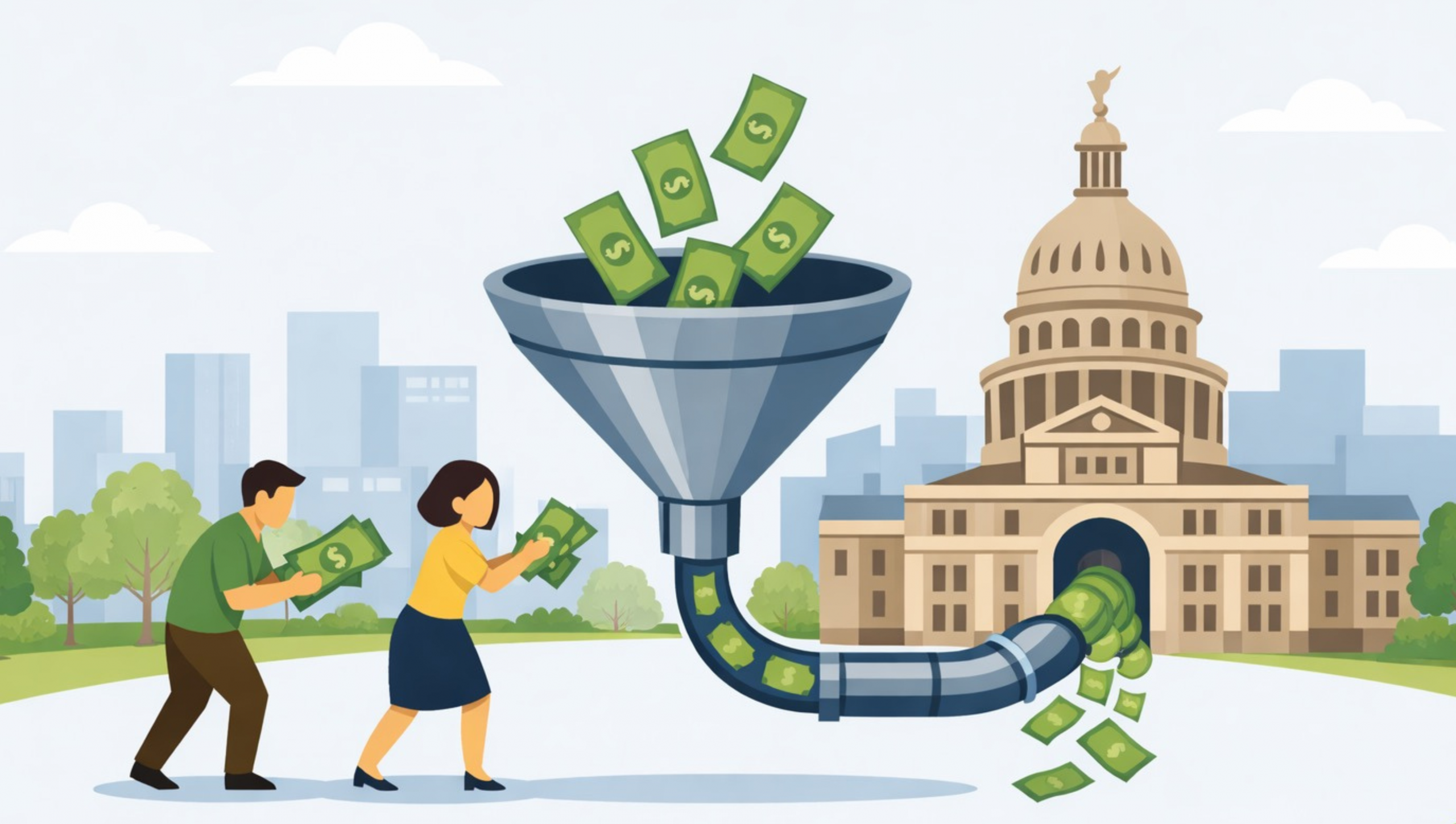An Overview
- Texans for Fiscal Responsibility provided a three-step process to eliminate all property taxes over the next decade by simply limiting government spending at the state and local levels of government and returning surplus collected taxpayer dollars to taxpayers.
- Unfortunately, the Texas Senate’s budget appropriates too much taxpayer money. It substantially increases all funds appropriations in the proposed 2024-25 budget above the 2022-23 budget by 16.3% to $308.0 billion and increases state funds appropriations (exclude federal funds) by 25.4% to $208.6 billion. Even excluding property tax relief effort amounts in the 2022-23 and 2024-25 budgets, all funds appropriations increase by 19.4%, and state funds appropriations increase by 20.9%, which are well above the rate of population growth plus inflation over the last two fiscal years of 16%.
- These increases in appropriations would be better allocated to new property tax relief, primarily through compression of school district maintenance and operations property taxes. This is the way to create a path to eliminating these property taxes, thereby giving Texans more of the right to own their property instead of perpetually renting from the government.
Texas Senate Budget Substantially Increases Appropriations
Table 1 shows the amount by which the Texas Senate proposes to increase appropriations compared with what was appropriated for the 2022-23 budget. While the Legislative Budget Board shows a comparison of what is expected to be spent in 2022-23 and what is appropriated for 2024-25, this comparison is not consistent as the total spending for 2022-23 is not complete and the 2024-25 spending is not available yet. Therefore, the best way to evaluate this budget is to compare appropriations to appropriations.
Table 1
Frozen Texas Budget Compared with the Senate’s Budget in CSHB 1 (In Millions)
| Source of Appropriations | 2022-23 Appropriations | 2024-25 Texas Frozen Budget | 2024-25 Senate Budget | 2024-25 Senate Budget Change | 2024-25 Senate Budget % Change |
|---|---|---|---|---|---|
| General Revenue Funds | $119,154.1 | $141,261.1 | $22,107.0 | 18.6% | |
| General Revenue Dedicated Funds | $6,319.9 | $6,519.8 | $199.9 | 3.2% | |
| General Revenue-Related Funds | $125,474.0 | $125,474.0 | $147,780.8 | $22,306.8 | 17.8% |
| Other Funds | $40,799.1 | $60,806.9 | $20,007.8 | 49.0% | |
| State Funds Total | $166,273.1 | $166,273.1 | $208,587.7 | $42,314.6 | 25.4% |
| Federal Funds | $98,531.6 | $99,451.5 | $919.9 | 0.9% | |
| All Funda Total | $264,804.7 | $264,804.7 | $308,039.2 | $43,234.5 | 16.3% |
The result is a massive increase in the Senate’s budget that is well above the Texas Frozen Budget, thereby reducing how much money is available for property tax relief.
The Senate’s budget includes $5.3 billion for property tax relief in current law and $9.8 billion in proposed new property tax relief. This new relief includes a package of Senate Bill 3 for raising the homestead exemption from $40,000 to $70,000 and to $100,000 for those 65 or older, Senate Bill 4 for compression of school district maintenance and operations property taxes, and Senate Bill 5 for business personal property tax relief. Even after excluding the $15.1 billion in new and old property tax relief for 2024-25 and the $6.2 billion for property tax relief in 2022-23, the Senate’s budget increase of 19.4% is well above the rate of population growth plus inflation of 16% over the last two fiscal years. In other words, there are too many taxpayer dollars going to appropriations instead of property tax relief.
And compared with the House’s budget, the Senate’s budget is $6.5 billion higher in state funds and $5.4 billion higher in all funds but with less in new property tax relief as the House has $12 billion for compression in House Bill 2, which is the gold standard to permanently reduce property taxes and put them on a path to elimination.
Table 2 shows a breakdown of the articles of the budget by type of funds. While there are massive double-digit and even triple-digit increases in some articles, the driving factors of the overall all fund increases are the largest parts of the budgets for Article III for Agencies of Education ($23.9 billion or 24.9% increase), Article II for Health and Human Services ($13.3 billion or 15.3% increase), Article VII for Business and Economic Development ($9.4 billion or 25.9% increase), and Article V for Public Safety and Criminal Justice ($5.3 billion or 38.9% increase).
Table 2
Frozen Texas Budget Compared with the Senate’s Budget by Funds and Article (In Millions)
| Article/Funds (General Revenue) | Appropriated 2022-23 | Senate CSHB1 2024-25 | Change | Percent Change |
|---|---|---|---|---|
| I – General Government | $5,594.2 | $9,146.5 | $3,552.3 | 63.5% |
| II – Health and Human Services | $34,447.2 | $42,138.9 | $7,691.7 | 22.3% |
| III – Agencies of Education | $64,033.9 | $69,772.3 | $5,738.4 | 9.0% |
| Public Education | $47,326.6 | $47,777.1 | $450.5 | 1.0% |
| Higher Education | $16,707.2 | $21,995.2 | $5,288.0 | 31.7% |
| IV – The Judiciary | $593.1 | $763.2 | $170.1 | 28.7% |
| V – Public Safety and Criminal Justice | $11,969.5 | $18,179.4 | $6,209.9 | 51.9% |
| VI – Natural Resources | $1,308.2 | $2,748.5 | $1,440.3 | 110.1% |
| VII – Business and Economic Development | $490.7 | $1,283.9 | $793.2 | 161.6% |
| VIII – Regulatory | $307.2 | $407.7 | $100.5 | 32.7% |
| IX – General Provisions | $0.0 | ($3,650.0) | ($3,650.0) | 0.0% |
| X – The Legislature | $410.2 | $470.7 | $60.5 | 14.7% |
| GR Funds Total | $119,154.1 | $141,261.1 | $22,107.0 | 18.6% |
| Article/Funds (State Funds) | Appropriated 2022-23 | Senate CSHB1 2024-25 | Change | Percent Change |
|---|---|---|---|---|
| I – General Government | $7,232.6 | $10,846.6 | $3,614.0 | 50.0% |
| II – Health and Human Services | $36,171.6 | $44,007.2 | $7,835.6 | 21.7% |
| III – Agencies of Education | $83,080.1 | $104,709.4 | $21,629.3 | 26.0% |
| Public Education | $60,467.6 | $76,250.7 | $15,783.1 | 26.1% |
| Higher Education | $22,612.4 | $28,458.8 | $5,846.4 | 25.9% |
| IV – The Judiciary | $967.2 | $1,127.9 | $160.7 | 16.6% |
| V – Public Safety and Criminal Justice | $12,182.0 | $18,358.3 | $6,176.3 | 50.7% |
| VI – Natural Resources | $2,956.1 | $4,749.7 | $1,793.6 | 60.7% |
| VII – Business and Economic Development | $22,548.6 | $27,142.4 | $4,593.8 | 20.4% |
| VIII – Regulatory | $724.5 | $825.3 | $100.8 | 13.9% |
| IX – General Provisions | $0.0 | ($3,650.0) | ($3,650.0) | 0.0% |
| X – The Legislature | $410.4 | $470.9 | $60.5 | 14.7% |
| State Funds Total | $166,273.1 | $208,587.7 | $42,314.6 | 25.4% |
| Article/Funds (All Funds) | Appropriated 2022-23 | Senate CSHB1 2024-25 | Change | Percent Change |
|---|---|---|---|---|
| I – General Government | $8,467.3 | $12,142.3 | $3,666.0 | 43.3% |
| II – Health and Human Services | $86,970.3 | $100,292.2 | $13,321.9 | 15.3% |
| III – Agencies of Education | $96,053.5 | $119,994.6 | $23,941.1 | 24.9% |
| Public Education | $72,402.9 | $88,768.1 | $16,365.2 | 22.6% |
| Higher Education | $23,650.5 | $31,226.6 | $7,576.1 | 32.0 |
| IV – The Judiciary | $971.7 | $1,132.1 | $160.4 | 16.5% |
| V – Public Safety and Criminal Justice | $13,509.6 | $18,762.7 | $5,253.1 | 38.9% |
| VI – Natural Resources | $7,816.0 | $8,002.2 | $186.2 | 2.4% |
| vII – Business and Economic Development | $36,547.9 | $45,995.8 | $9,447.9 | 25.9% |
| VIII – Regulatory | $734.0 | $896.4 | $162.4 | 22.1% |
| IX – General Provisions | $0.0 | $350.0 | $350.0 | 0.0% |
| X – The Legislature | $410.4 | $470.9 | $60.5 | 14.7% |
| XII – American Rescue Plan Act of 2021 | $13,314.9 | $0.0 | ||
| All Funds Total | $264,804.6 | $308,039.2 | $43,234.6 | 16.3% |
Of course, Article III also includes the property tax relief efforts; those efforts do not grow government and therefore inflate the amount of appropriations. However, there is still plenty of bloat throughout the budget, even when compared with the House budget, which should be reined in to provide more in property tax relief.
Conclusion
Like the Texas House’s 2024-25 budget, the Texas Senate’s 2024-25 budget appropriates too much money and provides too little in tax relief. In order for this to be a record amount of property tax relief, the $14.2 billion in property tax relief for the 2008-09 period adjusted for inflation would be about $20 billion in new relief today—not even accounting for population growth.
The state is expected to have an estimated $32.7 billion surplus in GRR available at the end of the current 2022-23 biennium. And if the Legislature froze appropriations to the 2022-23 appropriations, there would be more than $62 billion available in excess revenue collected. So, if 90% of this excess revenue was returned to taxpayers by compressing the school district M&O property taxes (HB 985), then $56.5 billion could put these property taxes on a path to elimination in just a few years. And with just $9.8 billion in new property tax relief in the Senate budget, it is not record tax relief. But there is more tax revenue available throughout the excessive increases in the budget outlined in this brief; this revenue could be used to get to at least $20 billion to compress school district M&O property taxes so there is a record in tax relief.
Ultimately, Texas should eliminate property taxes so Texans can have the right to own their property instead of perpetually renting from the government. By following the Texans for Fiscal Responsibility’s three-step process of passing a frozen state budget, using 90% of surplus dollars to compress school district M&O property tax rates until they are zero, and having local governments eliminate the rest of their property taxes with surplus dollars above a new local spending limit, Texas can eliminate property taxes soon. The time to start it is now.
Texans for Fiscal Responsibility relies on the support of private donors across the Lone Star State in order to promote fiscal responsibility and pro-taxpayer government in Texas. Please consider supporting our efforts! Thank you!
Get The Fiscal Note, our free weekly roll-up on all the current events that could impact your wallet. Subscribe today!




